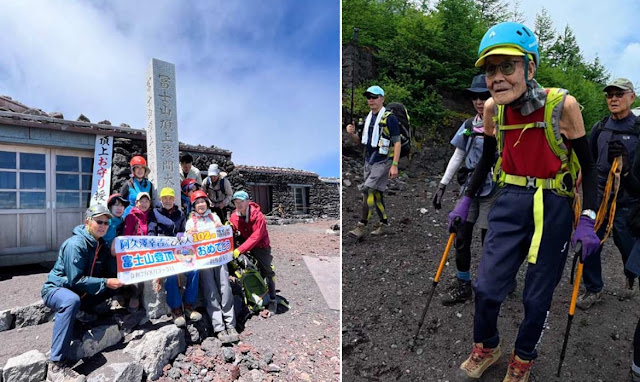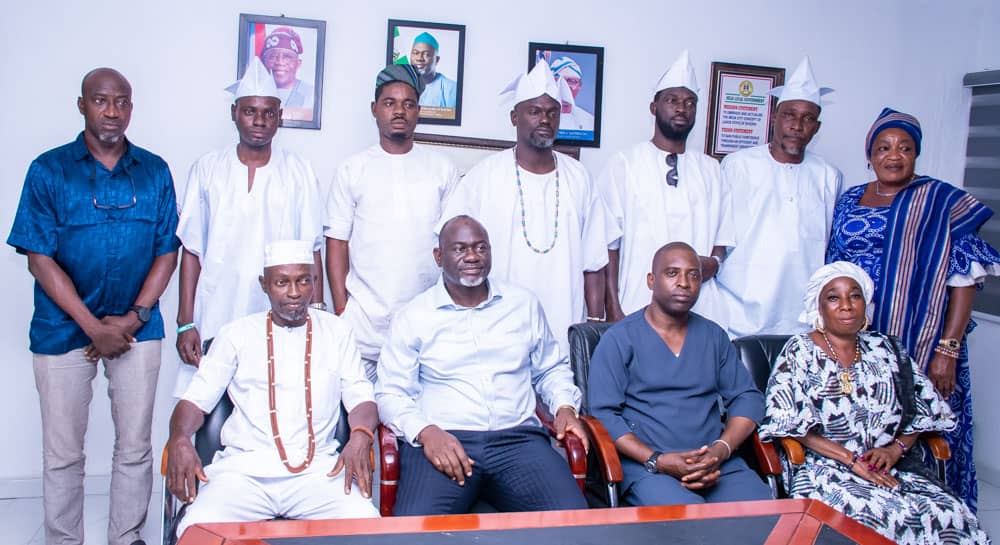In a remarkable display of resilience and determination, 102-year-old Kokichi Akuzawa has been officially recognized by Guinness World Records as the oldest person to climb Mount Fuji, Japan’s iconic 3,776-meter (12,388-foot) peak. The retired livestock farmer from Gunma Prefecture, born in 1923, reached the summit earlier this month, shrugging off a serious heart condition and a series of health setbacks to achieve the extraordinary feat. Yet, in a characteristically humble response, Akuzawa dismissed the accomplishment as “nothing special,” noting that he had summited the mountain before at age 96 and found the view unremarkable.
Akuzawa’s achievement is not just a testament to his physical endurance but also a reflection of his lifelong commitment to staying active and engaged. A regular hiker, volunteer at an elderly care center, and painting instructor, Akuzawa has become an inspiration to people around the world, proving that age is no barrier to pursuing ambitious goals. This article delves into the details of his historic climb, the challenges he overcame, and the broader significance of his story in a society increasingly focused on healthy aging.
A Lifelong Passion for the Mountains
Kokichi Akuzawa’s love for hiking began decades ago, rooted in the rugged landscapes of Gunma Prefecture, a region known for its natural beauty and mountainous terrain. Over the years, he developed a routine of climbing a mountain nearly every week, a habit that kept him physically fit and mentally sharp well into his centenarian years. Mount Fuji, Japan’s tallest and most revered peak, held a special place in his heart. At age 96, Akuzawa summited the mountain for the first time, an achievement that would have been remarkable for someone half his age. Yet, his determination to return at 102, despite significant health challenges, has elevated his story to global acclaim.
Speaking to Agence France-Presse (AFP) after his record-breaking climb, Akuzawa downplayed the significance of his feat. “I am six years older than the last time I climbed,” he said. “I have been there and seen the view many times, it wasn’t anything special. I reached the summit last time, too.” His understated response belies the physical and mental fortitude required to conquer Mount Fuji, a strenuous climb that tests even the most seasoned hikers.
Mount Fuji, or Fujisan, is more than just a mountain; it is a cultural and spiritual symbol of Japan. Designated a UNESCO World Heritage Site in 2013, the dormant volcano attracts thousands of climbers each year during its official climbing season, which runs from early July to early September. The Yoshida Trail, one of the most popular routes to the summit, involves a challenging ascent over rocky terrain and steep inclines, with unpredictable weather and high altitude adding to the difficulty. For a 102-year-old with a heart condition, the climb was nothing short of extraordinary.
Overcoming Health Setbacks: A Remarkable Recovery
Akuzawa’s journey to the summit was far from straightforward. Earlier this year, the centenarian faced a series of health challenges that could have derailed his ambitions. In January, he tripped while hiking near his home in Gunma Prefecture, an incident that left him shaken but undeterred. Shortly afterward, he contracted shingles, a painful viral infection that often affects older adults. As if that weren’t enough, Akuzawa was hospitalized with heart failure, a serious condition that required intensive medical care.
His 75-year-old daughter, Yukiko Akuzawa, described his recovery as nothing short of miraculous. “The recovery was so fast that his doctors could not believe it,” she told AFP. “He was determined to get back to his routine, and nothing was going to stop him.” Akuzawa’s resilience in the face of these setbacks is a testament to his indomitable spirit and disciplined lifestyle.
Following his hospitalization, Akuzawa wasted no time in rebuilding his strength. He resumed his early morning walks, a daily ritual that helped him maintain cardiovascular fitness and mental clarity. Within weeks, he was back to climbing local mountains on a weekly basis, carefully preparing his body for the grueling challenge of Mount Fuji. His commitment to fitness, even at 102, highlights the importance of regular physical activity in promoting longevity and well-being.
The Climb: A Three-Day Odyssey
Akuzawa’s ascent of Mount Fuji was carefully planned to accommodate his age and health condition. Unlike many climbers who attempt to reach the summit in a single day, Akuzawa spread the journey over three days, spending two nights in mountain huts along the Yoshida Trail. These huts, located at various stations along the route, provide basic accommodations and allow climbers to rest and acclimatize to the altitude.
The climb itself was a test of endurance and willpower. At 3,776 meters, Mount Fuji poses significant challenges, including thin air, steep gradients, and unpredictable weather conditions. For Akuzawa, the high altitude was particularly taxing, and there were moments when he considered turning back. “I almost gave up,” he admitted to AFP. “The air was so thin, and I could feel my heart working harder than usual.”
However, Akuzawa was not alone on this journey. He was accompanied by a group of travel companions, including his granddaughter, a nurse who provided medical support and encouragement throughout the climb. Their presence was crucial, offering both practical assistance and emotional motivation. “My granddaughter kept checking on me, making sure I was okay,” Akuzawa said. “Having her there made a big difference.”
The group’s camaraderie and careful pacing allowed Akuzawa to push through the most difficult moments. On the final day, as they approached the summit, the sense of achievement began to sink in—not for Akuzawa, who remained characteristically nonchalant, but for those around him who recognized the magnitude of his accomplishment. When he reached the crater rim at the top of Mount Fuji, Akuzawa became the oldest person ever to do so, a record officially certified by Guinness World Records.
A Life of Purpose: Beyond the Mountain
While Akuzawa’s climb has garnered international attention, it is only one facet of his remarkable life. Born in 1923, he grew up in a Japan that was vastly different from the modern nation we know today. As a young man, he worked as a livestock farmer, a physically demanding job that likely laid the foundation for his lifelong fitness. After retiring, he turned his energy to community service and creative pursuits, volunteering at an elderly care center and teaching painting to others.
His work at the care center is particularly poignant, given that he is older than many of the residents he serves. “I enjoy helping others,” Akuzawa told AFP. “It keeps me active and gives me a reason to get up every day.” His painting classes, meanwhile, reflect his artistic side, with students praising his patience and ability to inspire creativity. These activities underscore Akuzawa’s belief in living a purposeful life, regardless of age.
Akuzawa’s lifestyle aligns with the principles of “ikigai,” a Japanese concept that translates roughly to “a reason for being.” Ikigai emphasizes finding joy and purpose in daily activities, whether through work, hobbies, or relationships. For Akuzawa, hiking, volunteering, and teaching provide a sense of fulfillment that has kept him vibrant and engaged well into his second century.
The Science of Healthy Aging: Lessons from Akuzawa
Akuzawa’s story offers valuable insights into the science of healthy aging, a topic of growing interest in Japan and beyond. Japan is home to one of the world’s oldest populations, with over 28% of its citizens aged 65 or older as of 2025. The country’s centenarian population has also been rising steadily, with more than 90,000 people aged 100 or older, according to government data. Akuzawa’s ability to remain active and independent at 102 places him among an elite group, even in a nation renowned for longevity.
Experts attribute Japan’s high life expectancy to a combination of factors, including a healthy diet, strong social connections, and an emphasis on physical activity. The traditional Japanese diet, rich in fish, vegetables, and fermented foods, is believed to support cardiovascular health and reduce inflammation. Akuzawa’s disciplined routine of early morning walks and weekly hikes aligns with research showing that regular exercise can improve heart function, strengthen muscles, and enhance mental well-being in older adults.
Dr. Hiroshi Tanaka, a gerontologist at Tokyo University, commented on Akuzawa’s achievement in an interview with NHK. “Mr. Akuzawa’s story is a powerful example of how lifestyle choices can impact aging,” he said. “His recovery from heart failure and his ability to climb Mount Fuji at 102 demonstrate the importance of staying active and maintaining a positive outlook. It’s not just about physical strength—it’s about mental resilience and a sense of purpose.”
Akuzawa’s rapid recovery from heart failure is particularly noteworthy. Heart failure, a condition in which the heart cannot pump blood effectively, is often debilitating, especially in older adults. However, studies have shown that tailored exercise programs can improve heart function and quality of life in heart failure patients. Akuzawa’s commitment to rebuilding his strength through walking and hiking likely played a key role in his recovery, offering a model for others facing similar challenges.
Cultural Significance: Mount Fuji as a Symbol
Mount Fuji’s significance in Japanese culture cannot be overstated. Revered as a sacred site in Shinto and Buddhist traditions, the mountain has inspired artists, poets, and pilgrims for centuries. Its perfectly symmetrical cone, often capped with snow, is a national symbol, appearing in everything from ancient woodblock prints to modern advertising campaigns. Climbing Mount Fuji is seen as both a physical and spiritual journey, with many climbers seeking to witness the sunrise from the summit, known as “goraiko.”
For Akuzawa, the climb was less about spiritual fulfillment and more about personal challenge. His pragmatic attitude—“I’ve seen the view many times, it wasn’t anything special”—stands in contrast to the reverence many climbers feel, yet it underscores his focus on the act of climbing itself. For him, the mountain is not a symbol but a goal, one he has conquered multiple times.
Global Reactions: Inspiration Across Borders
Akuzawa’s achievement has resonated far beyond Japan, capturing the attention of media outlets and social media users worldwide. On X, posts celebrating his climb have garnered thousands of likes and shares, with users praising his determination and humility. “102 years old and climbing Mount Fuji? That’s incredible!” wrote one user. Another commented, “Kokichi Akuzawa is proof that you’re never too old to chase your dreams.”
His story has also sparked discussions about aging and fitness in other countries. In the United States, where the population is aging rapidly, Akuzawa’s example has been cited in articles about active aging. Fitness experts have pointed to his routine as evidence that consistent, moderate exercise can yield significant benefits, even in later life. “You don’t have to climb a mountain to stay healthy,” said Dr. Emily Carter, a geriatrician based in California. “But Mr. Akuzawa shows us that staying active and engaged can make a huge difference, no matter your age.”
Looking Ahead: No More Summits for Akuzawa
When asked if he planned to climb Mount Fuji again, Akuzawa was unequivocal: “No.” The response, delivered with his trademark bluntness, suggests that he sees his latest climb as the culmination of his mountaineering journey. At 102, he has nothing left to prove, having defied medical odds and set a world record in the process.
Instead, Akuzawa plans to continue his daily routine of walking, volunteering, and teaching. “I don’t think about stopping,” he told AFP. “I just keep going, one day at a time.” His words encapsulate a philosophy of living in the moment, a mindset that has served him well over his long and remarkable life.
For his family, particularly his daughter Yukiko and granddaughter, Akuzawa’s achievement is a source of immense pride. “He’s always been stubborn,” Yukiko said with a laugh. “But that’s what makes him who he is. He never gives up.”
A Legacy of Resilience
Kokichi Akuzawa’s climb of Mount Fuji at 102 is more than a record-breaking feat; it is a powerful reminder of the human capacity for resilience and determination. In an era where aging is often associated with decline, Akuzawa challenges stereotypes, showing that vitality and purpose can endure well into one’s centenarian years. His story is a beacon of hope for those facing health challenges or societal expectations about aging, proving that with discipline, support, and a touch of stubbornness, extraordinary things are possible.
As Japan and the world celebrate Akuzawa’s achievement, his legacy will inspire future generations to embrace active living and pursue their goals, no matter the obstacles. For now, the 102-year-old hiker from Gunma Prefecture will continue his quiet, purposeful life, leaving behind a record that may stand as long as Mount Fuji itself.








